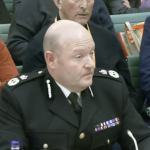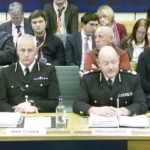The former Labour MP Ian Austin, who resigned from the Party over antisemitism, has given a series of powerful interviews this morning condemning antisemitism in the Labour Party and announcing that he will not be seeking re-election.
Speaking on Sky News, Mr Austin, who is an honorary patron of Campaign Against Antisemitism, was asked if his decision to leave the Labour Party and stand down as an MP was “personal”. In response, he explained: “I joined the Labour Party as a teenager in Dudley. I was a councillor there in my twenties, I worked for the Party and for the Labour Government in my thirties, and I became an MP and a Government minister in my forties, so this has been my life. This has been my life.
“I can’t really believe it’s come to this,” he said, “but I’ve got to be honest with people: I think that Jeremy Corbyn is unfit to lead the Labour Party. I think he’s certainly unfit to lead the country.”
Asserting that only two individuals can be Prime Minister the day after the election, Mr Austin remarkably declared: “I’ve sadly come to the conclusion that it can’t be Jeremy Corbyn,” and endorsed the Conservative Party Leader instead.
Visibly emotional, Mr Austin pointed out that he “could just disappear off back to Dudley, never say a word, keep quiet — but I think people in politics have got to stand up and tell the truth and you’ve got to do what you think is right, however difficult it is.”
In support of his decision, Mr Austin asserted that Mr Corbyn and Shadow Chancellor of the Exchequer, John McDonnell, have spent their careers in politics “working with, defending, supporting all types of extremists, including antisemites,” and backing genocidal antisemitic terrorist groups such as Hamas and Hizballah, whom Mr Corbyn has described as “friends”.
Mr Austin insisted that he has “thought about this long and hard,” and said: “But most shameful of all…you know under his [Mr Corbyn’s} leadership a political party with a proud record – a long history – fighting for equality, fighting racism, has become poisoned with anti-Jewish racism and it is a complete and utter disgrace, a complete disgrace.”
Earlier in the morning, Labour frontbencher Rebecca Long-Bailey was asked to respond to similar remarks by Mr Austin that he had made earlier still. She belittled his concerns as simply emerging from differences with Mr Corbyn on matters of policy, and insisted that although Labour had been slow to act on antisemitism, it had now instituted suitable processes and would in time win back the confidence of the Jewish community.
To this Mr Austin responded: “There’s no way they’ve dealt with this, and some of the people they’re selecting as candidates, even over the last few days, have said and done things which are unacceptable, and Jeremy himself by the way has said and done things which are antisemitic.”
Emphasising that “I’m not a Tory” and that “I’m not a Conservative. This isn’t where I wanted to be,” Mr Austin said that his decision today “has been the toughest thing.”
He proceeded to emphasise that antisemitism is an “institutional problem” in the Labour Party, observing that former Labour MPs Luciana Berger and Dame Louise Ellman were “chased out of the Party by racists” and they also “tried to target Margaret Hodge,” another female Jewish MP.
Mr Austin noted that Labour is the first party in history to be subjected to a full statutory investigation by the Equality and Human Rights Commission. That inquiry was launched on 28th May following a formal referral and detailed legal representations from Campaign Against Antisemitism, which is the complainant.
He also reminded viewers that almost nine out of ten British Jews believe Mr Corbyn is antisemitic, and said: “You’ve got to ask yourself: if a political party has caused such offence and distress to one of Britain’s communities, whose side are you on? Whose side are you on? When it comes to racism, I know what my responsibility is. This is a basic question of what’s right and what’s wrong. I think this is a really fundamental issue, and if you’re not going to stand up and tell the truth and do what’s right on something like racism, what are you going to do it on? What are you going to do it on?”
Anticipating that good friends of his who are standing as Labour candidates will feel betrayed and upset, and that some lifelong friends may not speak to him again, he declared that “in politics you’ve got to face up to tough decisions and do what you think is right.”
Asked whether he was abandoning others who have chosen to stay in the Labour Party and fight, Mr Austin replied: “I didn’t leave the Labour Party to join another Party. I didn’t do that in February. I left to shine a spotlight on what’s happening in the Party. And to demand other people step up and do something about it. And I’ve been fighting about this and arguing about this…people have said to me: ‘Ian you’ve got to stay and fight’. I said: ‘where’s the fight? You want me to stay and fight you’d better start fighting.’ I didn’t walk away from this fight.”
Mr Austin recognised the culpability of his erstwhile Party and colleagues: “This has happened on our watch. We have a responsibility for this. I can say it’s nothing to do with me and walk away from it all, but in the end, we’ve allowed this to happen in the Labour Party and we’ve got to take responsibility for it. And I do not want him [Mr Corbyn] to do to the country what I think he’s done to the Labour Party.” He also pointed out that he has launched a new organisation to combat extremism in politics.
Speaking of Mr Corbyn, Mr Austin concluded: “I think the Labour Party has been poisoned with extremism, intolerance, and antisemitism under his leadership,” adding: “It’s heartbreaking. I think what’s happened to the Labour Party is heartbreaking.”
Joe Glasman, Head of Political and Government Investigations at Campaign Against Antisemitism, said: “Ian Austin is truly a hero of the Jewish community and upstanding people everywhere. He is an inspiration to Jews and others who also once called the Labour Party their political home but who cannot remain in the Party under its antisemitic leadership. When it comes to integrity, Ian has few rivals, and we join him in mourning the Labour Party that was.”
In recent months, thirteen MPs and three peers have resigned from the Labour Party over antisemitism, along with a large number of MEPs, councillors and members.
Over 57,000 people have now signed our petition denouncing Jeremy Corbyn as an antisemite and declaring him “unfit to hold any public office.”









